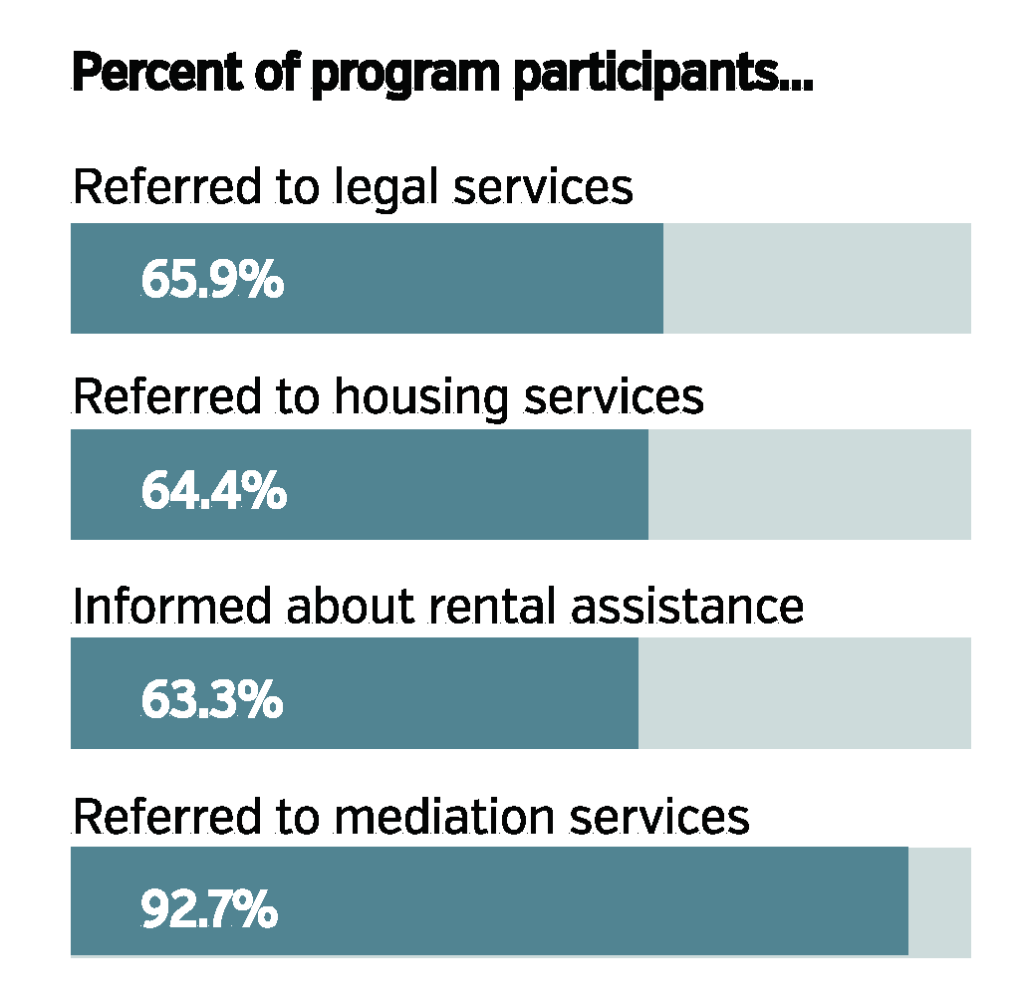This article is part of a series of perspectives on eviction mediation program development that is being supported by the American Arbitration Association-International Centre for Dispute Resolution Foundation. The AAA-ICDR’s grant is enabling RSI to expand our outreach to court ADR colleagues working in the fast-evolving eviction field, and we are tremendously grateful to the Foundation for their support.

As readers may remember, the 16th Judicial Circuit in Kane County, Illinois, launched its eviction mediation program in May 2021, with RSI as the program administrator. The program approaches the resolution of eviction cases holistically, with referrals to financial counseling and legal services as well as mediation. Mediations are conducted primarily via Zoom, with some in-person mediation permitted. As part of the AAA-ICDR Foundation grant, RSI Research Associate Dee Williams and I evaluated the program’s performance during its first year. The evaluation included program use, services provided, mediation outcomes and participant experience. The evaluation revealed a program that is succeeding on all metrics.
We found that the program had a high rate of referral, with 578 (42%) of the 1,392 eligible tenants making contact with the program coordinator after being referred by the judge. Almost two-thirds of tenants who accessed the program were referred to housing counseling, rental assistance and legal assistance. Not all cases required mediation, and some cases scheduled for mediation did not take place; thus, 388 (28%) of eligible cases were mediated. Of these, 74% resulted in an agreement that avoided eviction, which translated into eviction being avoided through mediation in 20% of all cases filed.
Overall Positive Experiences

In post-mediation surveys, both landlords and tenants in general indicated they had a good experience in mediation: 61% said they were highly likely to recommend mediation to a friend. They also indicated they experienced procedural justice, with 73% indicating the mediator treated them extremely fairly and 80% indicating they were treated with very much respect. Their perception of whether they were able to talk about what was important to them was lower, however, with 54% rating this highly. Attorneys were more likely to rate their experience highly overall: 71% were highly likely to recommend mediation to a colleague.
The one area of concern is that 19% of parties who responded to the survey wrote comments indicating they believed the mediator was biased or not active enough in helping them resolve their dispute, which equaled the percentage who wrote positive comments about the mediators’ fairness and helpfulness. RSI is investigating this further, with the hopes of identifying whether certain mediators may need further training.
Access, Tech Use Examined
We also asked survey respondents how they accessed the video mediation, whether they needed to borrow a mobile phone or computer from someone, whether they had to leave their home to attend the mediation, and whether they had any technical difficulties. Approximately 6 in 10 tenants used a mobile phone to participate, and almost everyone else used a personal computer. Our sample is very likely biased, as those who have ready access to the internet would be more likely to respond to the survey; nevertheless, we found that only 2 of 49 respondents borrowed a device and three went to someone else’s home. Five attended from work. Ten of 56 respondents indicated there were technical issues during their mediation. These included problems connecting, bad connections, people getting disconnected and someone’s microphone not working.
Support Breeds Success
When I interviewed the judge and program staff for an implementation report on the program, I found the judge was very supportive of the program and that both he and program staff believed landlord and attorney buy-in was essential to the success of the program. The evaluation indicates that the judge’s support was instrumental to the program’s high rate of referral and that landlords and attorneys who completed surveys generally had favorable opinions of the program. These both support the general belief that both judicial support and party buy-in are necessary characteristics of successful programs.
Tags: AAA-ICDR-Evictions, Kane County Eviction Mediation Program


Excellent update–and more importantly, clearly excellent program. Pity, besides the trial court level in this Illinois Circuit being supportive and recognizes the value of the program, not so much on the state judicial system.